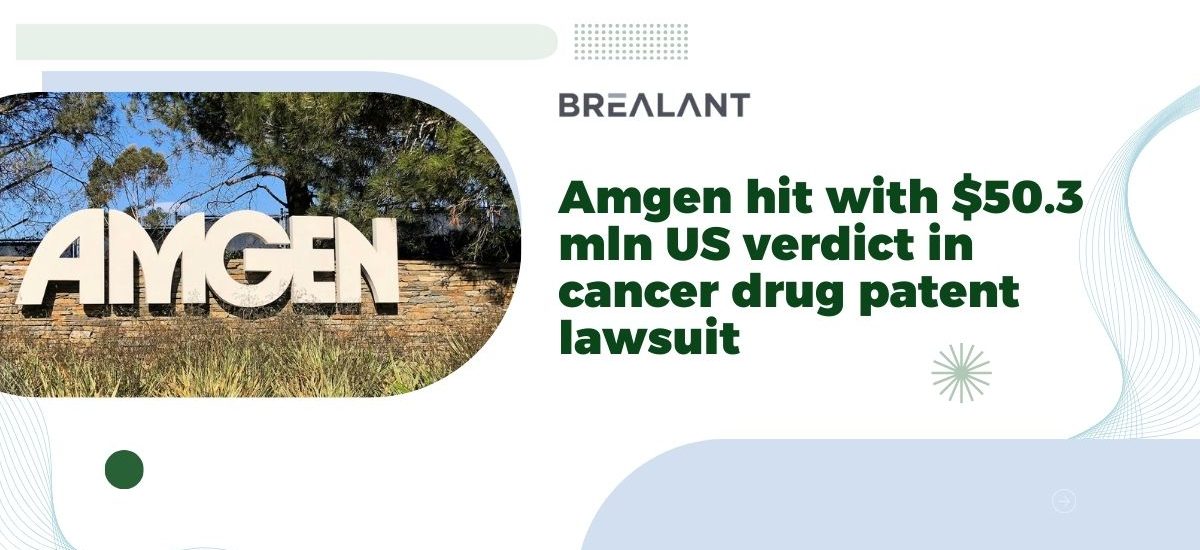



One of the top biotechnology businesses in the world, Amgen Inc., recently suffered a major legal defeat when a US federal jury found against the company in a complaint alleging patent infringement. The decision, which mandated that Amgen pay $50.3 million, brings to light the complex and risky realm of pharmaceutical patents as well as the intense rivalry in the biotech sector. In the pharmaceutical industry, where businesses spend billions on research and development (R&D) to introduce new medications to the market, this case highlights the crucial role intellectual property (IP) plays. Questions about innovation, competition, and the wider ramifications for patients and the healthcare system are brought up by the cancer drug patent lawsuit and its resolution.
The case focused on claims that Amgen’s cancer therapy medication violated a different company’s patent. The larger point at stake was whether Amgen had illegally used another company’s invention to obtain a competitive advantage, even if the particulars of the patent and the medicine in question were crucial to the court proceedings. The jury finally agreed with the plaintiff’s argument that Amgen’s medication included patent- protected intellectual technology. Amgen argued in its defence that the disputed patent was void or that the claimed technology was not violated by their medication.
The biotechnology sector functions at the nexus of substantial financial investment and cutting-edge science. The entire process of creating a new medication, from preliminary research to clinical trials to regulatory approval, can take over ten years and cost up to $2 billion. Patents are more than just legal papers in this context; they are essential to innovation and a business’s capacity to make money.
By granting exclusivity, patents enable businesses to recover their costs and finance further research. However, when disagreements occur, they can instigate heated conflicts. This tension is best shown by the Amgen instance. The plaintiff views the ruling as a win for safeguarding their invention. For Amgen, it serves as an expensive reminder of the dangers of negotiating a crowded and cutthroat intellectual property market.
Despite having a financial setback, the $50.3 million conviction has repercussions that go beyond fines. Such lawsuits, especially those involving claims of intellectual property theft, have the potential to damage a company’s brand. The capacity of Amgen, a significant participant in the biotech sector, to preserve its ethical reputation and inventive edge is essential to its interactions with partners, investors, and patients.
Furthermore, the decision may have an impact on Amgen’s future strategic choices. For the purpose of preventing such issues in the future, the business might need to reconsider how it handles licensing agreements, IP due diligence, and R&D spending. Legal disputes of this size also serve as a warning to other businesses in the sector, highlighting how crucial it is to strictly adhere to patent regulations.
The Amgen lawsuit highlights more general issues facing the pharmaceutical and biotech industries. Patent disputes are frequent and may entail intricate legal and scientific issues. The availability and cost of patient treatments, in addition to the businesses involved, may be significantly impacted by these instances. Resources that could have been used for innovation are frequently diverted to legal battles when businesses are involved in litigation. This dynamic has the potential to hinder advancement and postpone the launch of novel treatments. Additionally, the high costs involved with patent infringement—both in terms of litigation and damages—can dissuade smaller firms and startups from joining the market, restricting competition and potentially driving up medicine prices.
The biotech sector has to strike a careful balance. Strong patent protections, on the one hand, are necessary to encourage innovation. Conversely, monopolistic behaviour and excessive litigation can impede competition and restrict access to therapies that can save lives. Achieving a balance that promotes innovation and accessibility requires collaboration between policymakers, business executives, and legal professionals.
Additionally, the Amgen ruling calls into question the function of the courts and the U.S. Patent and Trademark Office (USPTO) in resolving intricate cases. To preserve systemic trust, it is essential to make sure that patents are awarded properly and that infringement disputes are settled quickly and equitably.
Although there are major legal and financial considerations in the Amgen case, it’s crucial to remember that patients are the ultimate stakeholders. One of the costliest and most highly patented medical therapies available is cancer medication. Patients frequently suffer from increased costs or restricted access to pharmaceuticals as a result of businesses battling over patents. The case’s conclusion may affect the accessibility and pricing of the contested medication by influencing how soon generic or biosimilar equivalents become accessible. Timely and cost-effective access to appropriate therapies is critical for cancer patients.
The Amgen case serves as an example to the biotech sector about the enormous risks involved in patent battles and how they may upend even the most well-established businesses. The expert of Brealant is there for the protection of your patent from unwanted infringement. Know more about the nuances of IP from Brealant.